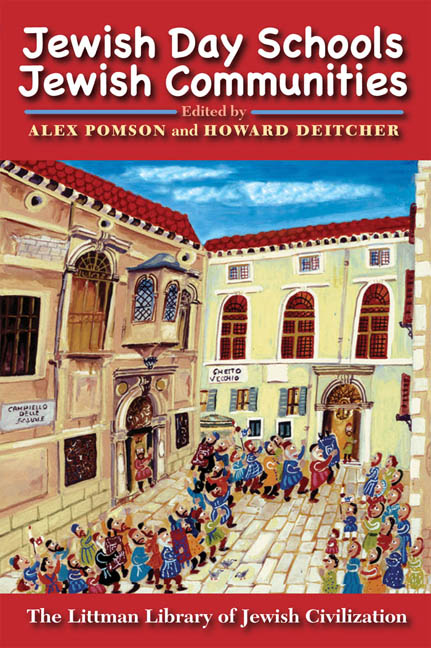Book contents
- Frontmatter
- Dedication
- Acknowledgements
- Contents
- Note on Transliteration
- Introduction: Jewish Schools, Jewish Communities: A Reconsideration
- PART I Insights from Public and General Education
- PART II Cross-Cultural Insights
- PART III Insights through the Prism of Community
- 13 Relationships between Schools and Parents in Haredi Popular Literature in the United States
- 14 The Impact of Community on Curriculum Decision-Making in a North American Jewish Day School
- 15 Ideological Commitment in the Supervision of Jewish Studies Teachers: Representing Community
- 16 Schooling for Change in the Religious World: An Educational Experiment in a Religious Junior High School in Israel
- 17 Home-Made Jewish Culture at the Intersection of Family Life and School
- 18 Teacher Perspectives on Behaviour Problems: Background Influences on Behavioural Referral Criteria and Definitions of Rebellious Behaviour
- 19 Shabbatonim as Experiential Education in the North American Community Day High School
- 20 Teaching Leadership through Town Meeting
- 21 Building Community in a Pluralist High School
- Contributors
- Index
19 - Shabbatonim as Experiential Education in the North American Community Day High School
from PART III - Insights through the Prism of Community
- Frontmatter
- Dedication
- Acknowledgements
- Contents
- Note on Transliteration
- Introduction: Jewish Schools, Jewish Communities: A Reconsideration
- PART I Insights from Public and General Education
- PART II Cross-Cultural Insights
- PART III Insights through the Prism of Community
- 13 Relationships between Schools and Parents in Haredi Popular Literature in the United States
- 14 The Impact of Community on Curriculum Decision-Making in a North American Jewish Day School
- 15 Ideological Commitment in the Supervision of Jewish Studies Teachers: Representing Community
- 16 Schooling for Change in the Religious World: An Educational Experiment in a Religious Junior High School in Israel
- 17 Home-Made Jewish Culture at the Intersection of Family Life and School
- 18 Teacher Perspectives on Behaviour Problems: Background Influences on Behavioural Referral Criteria and Definitions of Rebellious Behaviour
- 19 Shabbatonim as Experiential Education in the North American Community Day High School
- 20 Teaching Leadership through Town Meeting
- 21 Building Community in a Pluralist High School
- Contributors
- Index
Summary
THE RAPID PROLIFERATION in North America during the past decade of new communal and Conservative Jewish day high schools has caught many by surprise. For years nearly all Jewish day high schools were run under Orthodox auspices. However, beginning in the 1990s, the demand for Jewish day school education beyond eighth grade expanded among a more liberal constituency. Families pleased with their children's elementary day school education were eager for that education to continue into the high school years. Marvin Schick reports that between 1992 and 2004 the numbers of students in American non-Orthodox day high schools grew from 1,500 to 4,100. In 2007 we know of thirty-four such high schools throughout North America.
These schools all provide a formal Jewish education through academic classes in Jewish subjects; now many have created ‘experiential’ opportunities for their students ‘to live their Judaism’. The focus of this chapter is on the most common intensive experiential opportunity the schools offer, the Shabbaton, a retreat focusing on the communal celebration of the sabbath. These Shabbatonim are a distinctive form of experiential Jewish education; yet despite their widespread implementation and the growth of experiential educational efforts in day schools, they have been given little attention in the educational literature. To address this lack, we draw on our experiences in training school-based experiential educators in order to discuss the educational goals of these Shabbaton programmes, the principles of running a successful programme, and the challenges faced by the experiential educators who are charged with planning and implementing these programmes.
Background
In North America, the non-Orthodox Jewish day high school came of age during the decade between 1995 and 2004. These years saw existing schools grow and new schools created in communities throughout the continent. Of the current thirty-four such high schools in North America, twenty-eight identify themselves as communal and six as Conservative. Officially, communal or community schools are open to Jewish students across a broad spectrum of Jewish backgrounds and do not follow the teachings of a single religious denomination; the Conservative schools follow the teachings of their movement. However, the realities on the ground are more varied than official policy would suggest.
- Type
- Chapter
- Information
- Jewish Day Schools, Jewish CommunitiesA Reconsideration, pp. 341 - 360Publisher: Liverpool University PressPrint publication year: 2009



